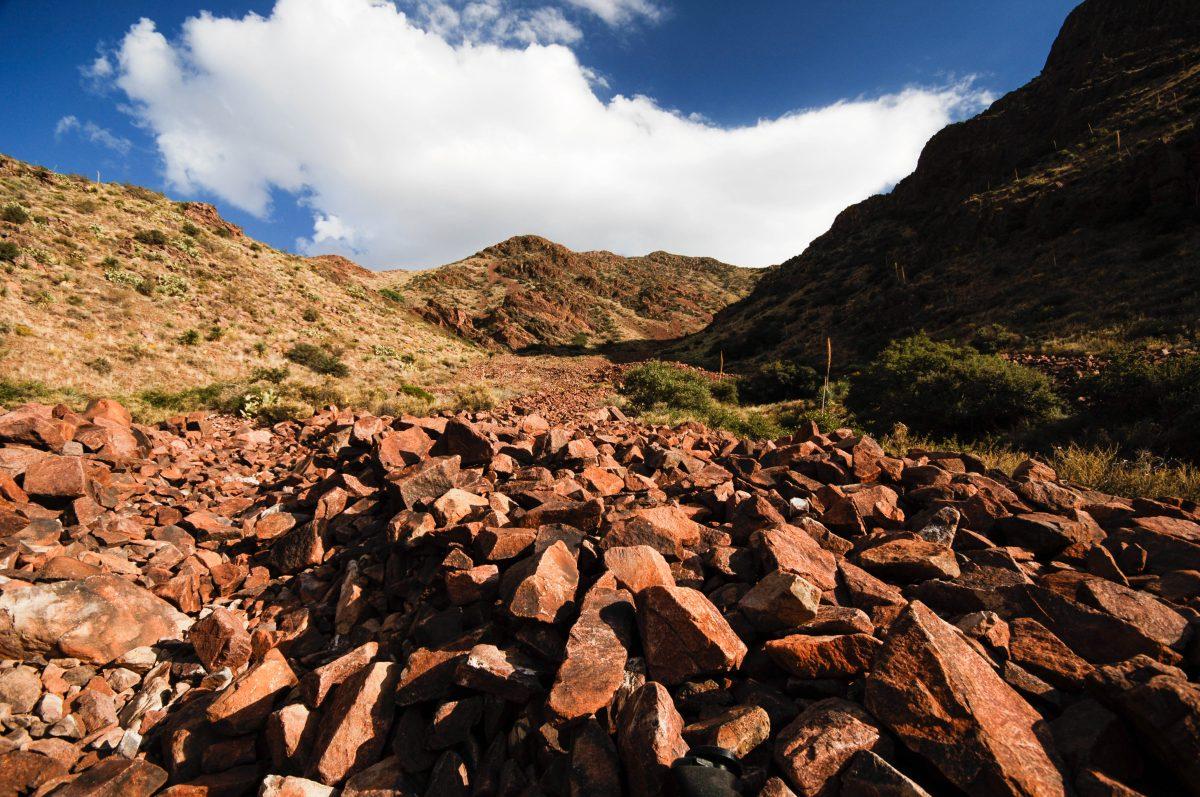Surrounded by a city and trampled by tourists, the rugged mountains of a rare Texas ecosystem have literal scars made by people heedless of the destruction they leave in their path.
Franklin Mountains State Park in El Paso is part of the Trans-Pecos, the only Texas region with mountainous and desert habitats. With hiking trails and campgrounds, state park workers said the park is in danger of being “loved” to death by the people drawn to its beauty and biodiversity.
Cesar Mendez, the Franklin Mountains State Park’s superintendent, said hikers routinely disobey trail signs placed to protect sensitive habitat. In creating their own paths, they are also creating a cycle of destruction, he said.
“When hikers want to make their own trails, they’re moving rocks around, which essentially disrupts the traffic that flows from the top of the mountain to the bottom,” Mendez said. “Emphasis on the word mountain — it’s not a flatland — so there’s major damage being done when inexperienced hikers take on unofficial trails.
“Eventually, the soil on the mountain gets exposed, creating scars on the mountain,” Mendez explained.
Park authorities are proposing new regulations including increased signage, blocking areas not meant for hikers or bikers and adding cables as barriers, he said. Planting gauge wire baskets to keep soil in place is also being considered.
The problem is growth, said Scott Cutler, president of the Franklin Mountains Wilderness Coalition. Created in the 1970s, the FMWC works to protect the mountains from the dual threats of city development and tourists who fail to recognize the fragile nature of the ecosystem, Cutler said. Just one person can have a negative impact on the landscapes.
“I think it degrades the experience of visitors when they go into a natural area that is trashed, eroded or tagged compared to one that is undisturbed,” Cutler said. “Because eventually, almost everybody will have the opportunity to hike a trail at the Franklins, so we want to protect it.”
As El Paso continues to grow, visitors to the park will grow, too, Cutler said. The coalition is advocating for more parkland and protections to the surrounding area, he said.
“Certain spots like the Tom Mays campsite or the McKelligon Canyon will essentially be overworked and visitors won’t get to have that experience they went for,” Cutler said.
The park is an ideal place to reconnect with the natural world and to bring calm to a person’s life, noted Cutler. Preserving that is only possible if visitors understand the sensitivity of the ecosystem and how vulnerable it is to abuse, he added.
“Rather than addressing the problem once it arises, it’s equally important, if not more so, to identify the cause of the destruction,” Cutler said. “Which in this case, is the ignorance about the proper way to act outdoors and treat the natural environment.”
While the Franklin Mountains aren’t going to solve the climate problem, Cutler said they are an important part of the solution.
“Having a native ground cover helps reduce the temperature build up in a community, especially where we’re located, which is in the desert.” Cutler explained.
High daytime temperatures create stored heat that radiates throughout the night, but the natural environment of the park helps to mitigate these problems.
“So you never really get things cooling off in the city,” Cutler said. “But once you’re in the open space of the state park, the moisture that comes from the plants helps cool the air, and also reflects some of the heat so that the ground doesn’t store so much heat.”
Protecting open spaces like the Franklin Mountains State Park is both an argument — and a solution — to helping mitigate climate change, noted Cutler.
This story is a collaboration between The Battalion and upperclassmen in Texas A&M’s journalism degree. To see the online copy of the Climate Change extra print edition, click here.









